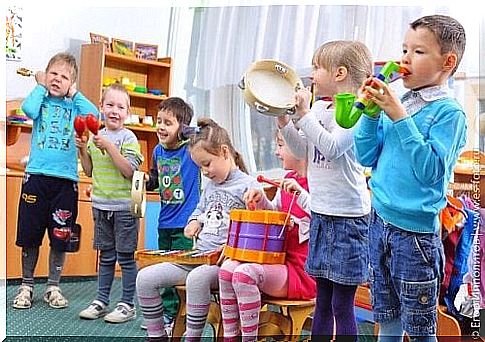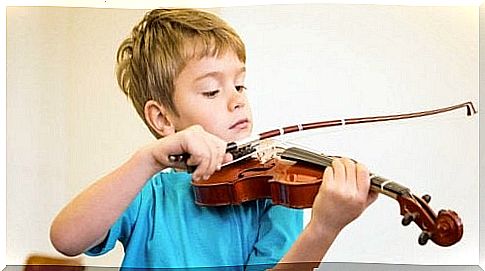8 Benefits Of Playing A Musical Instrument In Childhood

Many benefits of playing a musical instrument in childhood are known today . Although most children do it for entertainment, their regular practice has a significant impact on their cognitive, social and artistic development process.
From the beginning of the learning process, important brain skills are exercised. The ear becomes sharper, and the ability to express yourself is improved. In addition, the strengthening of this art:
- Facilitates the formation of the child’s personality.
- It improves your self-esteem.
Are there more reasons to learn to play an instrument in childhood? Of course! Given that many parents are still unaware, next we want to review the benefits of promoting this activity from the earliest years of life.
1. Promotes emotional well-being

Contact with musical instruments and toys helps to promote the feeling of emotional well-being in children. By enjoying music through their practice, little ones release pent-up energy and feel better about themselves.
This effect is particularly beneficial for children who are easily frustrated or who do not know how to verbalize their feelings. Melodies and songs become one of the main resources of expression and communication.
2. Improves cognitive skills
Playing a musical instrument in childhood has important effects on brain development and strengthening cognitive skills. Children who play guitar, drums, piano or any other musical device have better concentration and problem solving skills.
On the other hand, music stimulates the activity of neurons and makes them more efficient in transmitting signals. In this way, over time, it leads to faster thinking and better memory. Furthermore, it favors the development of critical and logical thinking and stimulates the brain areas related to mathematics.
3. Strengthens language skills
The relationship with music plays a very important role in the development of children’s language skills. Both musical instruments and song lyrics can help:
- Expand vocabulary.
- Make correct use of the language.
4. Promotes healthy social skills
People who learn to play a musical instrument in childhood find it easier to get along in their social environment. As a child’s self-esteem and self-confidence is strengthened, he or she is less afraid to be in contact with both adults and other children.

On the other hand, when he shares this talent with his friends, he learns cooperative work and associative play. If the little ones play “band”, they discover together the magic of music and learn to resolve differences and work together.
5. Fosters creativity
Musical instruments are an excellent resource for stimulating creativity and curiosity in young children. When they improvise on their flute, xylophone or guitar, they strengthen the area of the brain that allows them to innovate and create in any other area.
6. Teach patience: playing a musical instrument in childhood
Music learning patterns help strengthen children’s patience skills. As some are well aware, little ones do not easily appreciate this value. So when they do the exercise of playing an instrument, they learn that it takes time to make it sound perfect.
However, it is important to guide and support them so that they do not give up when they encounter difficulties. Sometimes, when there is no one to tell them that they will be able to, they prefer to give up on the idea of learning to play the instrument.
7. Develops gross and fine motor skills
To play the strings of a guitar or maintain coordination when playing the piano or drums, it is necessary to exercise good gross and fine motor skills. In fact, any instrument requires these skills.

Therefore, when playing a musical instrument in childhood, children consolidate some of their motor skills and discover how to coordinate their extremities to create music. In addition, they learn to control their muscles and movements, as many instruments require this skill.
8. Provides continuous learning
The relationship with music and instruments teaches them to value continuous learning. Many children fall in love with this art and decide to explore it in many ways. So, after mastering an instrument, it is normal that they want to learn to use another one.
At the same time, when they find a multitude of possibilities in the musical environment, others decide that they want to learn to sing or compose their own works of art. Therefore, the whole set implies learning more about the subject.
In summary, learning to play a musical instrument in childhood is a great support for the integral formation process. So, as we encourage other arts, it would be good to give children musical toys or instruments from an early age.









